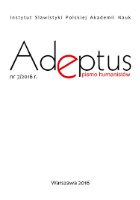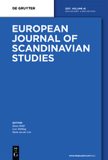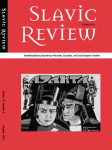
Slavia Meridionalis
Scope & Guideline
Empowering research with accessible knowledge and insights.
Introduction
Aims and Scopes
- Interdisciplinary Slavic Studies:
The journal encompasses a broad spectrum of topics related to Slavic cultures, incorporating historical, literary, and sociolinguistic perspectives. - Linguistic Analysis and Syntax:
A significant focus on syntactic structures, language change, and comparative linguistics highlights the journal's contribution to understanding Slavic languages. - Cultural and Historical Contexts:
The journal emphasizes the importance of historical events and cultural narratives in shaping contemporary Slavic identities and literatures. - Literary Criticism and Theory:
It provides critical insights into Slavic literature, exploring themes such as modernism, feminism, and post-socialist narratives. - Social Issues and Activism:
An emerging theme in the journal is the exploration of social issues, including gender rights and activism, reflecting contemporary societal challenges.
Trending and Emerging
- Post-Socialist and Post-Yugoslav Narratives:
There is a growing interest in literature and cultural studies that address the legacies of socialism and the complexities of post-Yugoslav identities, reflecting ongoing societal transitions. - Interdisciplinary Approaches to Language:
An increase in studies that combine linguistic analysis with cultural, historical, and social perspectives indicates a trend towards more holistic approaches in understanding Slavic languages. - Gender Studies and Feminist Perspectives:
Emerging themes in feminist readings of literature and gender rights activism illustrate a shift towards exploring gender as a crucial lens for cultural analysis. - Digital Humanities and Technology in Research:
The incorporation of digital methodologies in studying language and literature signifies an innovative approach to Slavic studies, enabling new forms of analysis and engagement. - Social Justice and Activism in Literature:
A notable trend is the exploration of literature as a medium for social justice and activism, reflecting broader societal concerns and the role of humanities in addressing contemporary issues.
Declining or Waning
- Traditional Linguistic Studies:
There has been a decrease in publications focusing purely on traditional linguistic studies without interdisciplinary connections, as researchers increasingly seek to integrate cultural and social contexts. - Historical Linguistics:
The focus on historical linguistics appears to be waning, as contemporary issues and sociolinguistic factors gain more attention in current research. - Nationalistic Narratives in Literature:
Topics centered around nationalistic narratives in Slavic literature have become less frequent, possibly due to a broader interest in transnational and multicultural perspectives. - Formal Syntax and Grammar Rules:
Research strictly adhering to formal syntax and grammar rules has seen a decline, with scholars favoring more applied linguistics that address real-world language use and social implications.
Similar Journals

Adeptus
Cultivating Knowledge Across Slavic Languages and SocietiesAdeptus is a pioneering open-access journal published by the Polish Academy of Sciences, Institute of Slavic Studies, specializing in Slavic studies and cultural research. Since its inception in 2014, the journal has aimed to foster scholarly dialogue and advance knowledge across various disciplines related to Slavic languages, literature, history, and sociology. With an ISSN of 2300-0783, Adeptus has positioned itself as a vital resource for researchers, professionals, and students engaged in Slavic studies, offering a platform for high-quality, peer-reviewed articles that explore diverse topics within the field. The journal's open-access model promotes accessibility and dissemination of knowledge, making it a significant contributor to the academic landscape. Located in Warsaw, Poland, Adeptus continues to thrive as a key outlet for innovative research, inviting submissions that embody rigorous scholarship and insightful perspectives.

Zbornik Matice Srpske za Slavistiku-Matica Srpska Journal of Slavic Studies
Fostering Dialogue in Slavic StudiesZbornik Matice Srpske za Slavistiku - Matica Srpska Journal of Slavic Studies, published by Matica Srpska in Serbia, is a prominent academic journal focusing on the diverse and rich field of Slavic studies. With an ISSN of 0352-5007 and a commitment to advancing knowledge in linguistics, literature, and cultural contexts, this journal serves as a vital resource for researchers, professionals, and students alike. Although designated as an open access journal, its significance is highlighted by its ranking in the lower quartiles of 2023 across various categories, including Q4 in Linguistics and Language and Q3 in Literature and Literary Theory. The journal's Scopus rankings further reflect its position, with a percentile of just 8th for Language and Linguistics. These factors underscore the journal's ongoing contribution to Slavic scholarship from 2019 to 2024, fostering dialogue and exploration in a field that remains crucial for understanding Eastern European cultures and languages.

FRENCH REVIEW
Navigating the Rich Tapestry of French Academic InquiryFRENCH REVIEW, published by Johns Hopkins University Press, is a premier journal in the fields of Cultural Studies, Education, Linguistics and Language, and Literature and Literary Theory. With its ISSN 0016-111X and E-ISSN 2329-7131, this journal serves as a vital resource for scholars and practitioners seeking to engage with contemporary topics through rigorous academic discourse. The journal has made notable strides in its impact factor, ranking in the third quartile for Cultural Studies and Linguistics, as well as the second quartile for Literature. While it currently does not offer open access, FRENCH REVIEW remains committed to fostering critical analysis and interdisciplinary approaches, effectively contributing to the advancement of research and understanding in its respective fields. With its converged years spanning from 2002 to 2024, this journal is an essential platform for exchanging ideas and enhancing knowledge in the vibrant landscape of French studies and beyond.

European Journal of Scandinavian Studies
Showcasing groundbreaking research in Scandinavian linguistics.European Journal of Scandinavian Studies is an esteemed journal published by Walter de Gruyter GmbH, dedicated to advancing scholarship in the fields of Cultural Studies, Linguistics and Language, and Literature and Literary Theory. Since its inception in 2010, the journal has been a pivotal platform for researchers and scholars, showcasing cutting-edge research and critical discussions pertaining to Scandinavian languages and cultures. With an ISSN of 2191-9399 and an E-ISSN of 2191-9402, the journal emphasizes accessibility to impactful academic work, despite its current non-open access model. While the journal is categorized within the Q4 quartile for Cultural Studies and Linguistics/Language, it has shown notable potential in ranking higher in its specialized domains, fostering a growing community of researchers invested in Scandinavian studies. The journal's office is located in Berlin, Germany, further enriching its European scholarly context. As it continues to evolve, the European Journal of Scandinavian Studies serves as a vital resource for academics seeking to engage deeply with the multifaceted aspects of Scandinavian culture and linguistics.

SLAVIC AND EAST EUROPEAN JOURNAL
Charting New Territories in Slavic and East European ResearchThe Slavic and East European Journal (ISSN: 0037-6752) is a distinguished publication focused on the rich tapestry of Slavic and Eastern European cultures, languages, and literatures. Published by the Ohio State University’s Department of Slavic and East European Languages & Culture, this journal serves as a vital platform for scholars and researchers keen on exploring linguistic diversity and cultural heritage in these regions. With a wide-ranging scope, the journal addresses significant topics within Cultural Studies, Linguistics, and Literature, currently categorized in Q4 and Q3 quartiles across various academic metrics. Although it does not offer open access, anticipation is high among academics seeking to contribute or access cutting-edge research that pushes the boundaries of understanding these complex fields. As it converges from 2009 to 2024, the Slavic and East European Journal continues to uphold its commitment to academic excellence and community engagement, making it an essential resource for anyone dedicated to the study of Slavic and Eastern European traditions.

Studia z Filologii Polskiej i Slowianskiej
Exploring the Depths of Slavic LinguisticsStudia z Filologii Polskiej i Slowianskiej is a prominent journal published by the Polish Academy of Sciences, Institute of Slavic Studies, focusing on the rich and diverse field of linguistics and language studies, particularly within the Slavic context. With the ISSN 0081-7090 and E-ISSN 2392-2435, this open-access journal has been a valuable resource for researchers, professionals, and students since its transition to an open-access model in 2014. It features rigorous peer-reviewed articles that contribute to the understanding of linguistic phenomena and cultural narratives across Slavic languages. Recognized within the Q3 quartile of linguistics and language in 2023, it ranks at the intersection of arts, humanities, and social sciences, providing insights that echo through disciplines such as sociolinguistics, psycholinguistics, and philology. In its ongoing publication trajectory from 2011 to 2023, Studia z Filologii Polskiej i Slowianskiej continues to foster academic discourse and collaboration, positioning itself as a key player in the global linguistic community.

Journal of Slavic Linguistics
Bridging Theory and Practice in Slavic LinguisticsJournal of Slavic Linguistics, published by SLAVICA PUBLISHERS, is a key academic resource dedicated to the exploration of Slavic languages and linguistics. Established to provide a comprehensive platform for scholarly research, this journal addresses the intricate dynamics of Slavic phonetics, syntax, semantics, and discourse, making significant contributions to both theoretical and applied linguistics. The journal holds an impact factor that reflects its value in the linguistic community, particularly as it is ranked in the Q4 category in Linguistics and Language for 2023. With a focus on a wide range of topics within the field, the Journal of Slavic Linguistics serves as an essential reference for researchers, educators, and students alike, fostering an appreciation and deeper understanding of Slavic linguistic phenomena. Although currently not an Open Access journal, it remains accessible to a broad audience keen on engaging with contemporary linguistic scholarship.

Lingua Montenegrina
Pioneering Research in Montenegrin Linguistics and Cultural StudiesLingua Montenegrina is a distinguished academic journal dedicated to exploring and advancing the fields of Montenegrin language and literature. Published by the Institute of Montenegrin Language and Literature, this journal serves as a vital platform for researchers, educators, and students interested in the nuances and development of Montenegrin linguistics, literature, and cultural studies. With an ISSN of 1800-7007, it contributes significantly to the scholarly discourse in the region and beyond. While the journal operates under a traditional subscription model, it ensures that its readership has access to high-quality research that is pivotal for understanding Montenegrin identity and cultural expressions. The commitment of Lingua Montenegrina to rigorous academic standards and its focus on regional studies positions it as an essential resource for those looking to deepen their understanding of the Montenegrin language and its literary heritage.

Vestnik Slavianskikh Kultur-Bulletin of Slavic Cultures-Scientific and Informational Journal
Bridging Past and Present in Slavic ScholarshipVestnik Slavianskikh Kultur-Bulletin of Slavic Cultures is a distinguished scientific and informational journal published by the State Academy of Slavic Culture. This journal, with ISSN 2073-9567, plays a pivotal role in the field of Slavic studies, providing a platform for the dissemination of cutting-edge research, cultural discourse, and scholarly analysis pertaining to Slavic cultures and civilizations. The journal aims to foster a deeper understanding of Slavic heritage, literature, and the societal dynamics shaping these cultures today. Although currently lacking an open access model, it remains an important resource for researchers, professionals, and students interested in the rich tapestry of Slavic traditions and contemporary cultural phenomena. With its thoughtful curation of articles, Vestnik Slavianskikh Kultur is poised to contribute significantly to ongoing scholarly conversations within the humanities.

SLAVIC REVIEW
Exploring the Depths of Slavic Culture and History.SLAVIC REVIEW, published by Cambridge University Press, is a prominent academic journal that delves into the rich tapestry of Slavic studies, focusing on the cultural, historical, and social dimensions of Slavic regions. With an ISSN of 0037-6779 and an E-ISSN of 2325-7784, this journal holds a significant position within the academic community, ranking in the Q2 category of Arts and Humanities (miscellaneous) and achieving a Q1 rating in Cultural Studies as of 2023. Notably, the journal has consistent relevance in the field, as evidenced by its Scopus rankings—Rank #260 in Cultural Studies and Rank #204 in Miscellaneous Arts and Humanities. Since its converged years starting from 1966 up to the present, SLAVIC REVIEW has been an essential resource for researchers, professionals, and students aiming to deepen their understanding of Slavic cultures. While it operates on a traditional subscription model and does not provide open access, the journal remains a vital platform for pioneering research and critical discourse in Slavic studies.